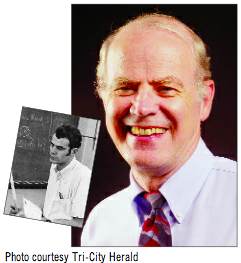May 2003
15-17 Class Reunions (1933, 1943, 1953), Missoula
17 UM Commencement
19 Alumni Dinner,
Portland, Ore.
20-27 Alumni Travel,
In the Wake of Lewis & Clark
June 2003
8-16 Alumni College Abroad, Swiss Alps
For more information on these events, call the UM Alumni Association: 1-877-UM ALUMS
arrived on campus, strove mightily to step out of that shadow. We seldom succeeded, because he became a bit larger than life.

Still, the Kaimin remained a hot issue both on and off campus. In the two years I was most involved, 1968-69 and 1969-70, we covered and editorialized about the Vietnam War, the anti-war movement, drug use, student rights, and legalizing prostitution. And our reporters exposed an ROTC professor who had publicly pilloried the school for its immorality and then was caught soliciting a police decoy prostitute in Salt Lake City.
I had the luck to interview a tipsy Donn Pearce, the former prison inmate who wrote Cool Hand Luke, at the home of English Professor James Lee Burke (who himself would later become famous for his Dave Robicheaux detective novels). Pearce lived up to his publicity photos, which made him look like a sleepy, hung-over iguana with a bad haircut. The interview was a ribald tale of life in Florida’s Raiford Prison—the incorrigibility of what he called “alcoholic check passers,” male prisoners finagling to join the prison choir so they could eyeball the women inmates, and such bizarre folks as the lion tamer who had shot free-ranging cattle to feed his charges, believing the beef was wild and free.
Then, as now, Missoula was a hub for academic freedom, which regularly found its voice in elegant letters to the editor by English Professor Edmund Freeman; for provocative thought from School of Journalism Dean Nathaniel Blumberg; and for professors like Marguerite Ephron, who schooled me equally in the dactylic hexameter of Virgil’s Aeneid and in her warmth and care for harried students.
When I struggled to handle the daily issues of editing a campus daily, journalism Professor Ed Dugan was a judicious listener whose questions revealed the answers with never a real word of advice. J-school Professor Bob McGiffert remains the only man I’ve seen make a pressman’s hat in one class, mimic a pack of dogs singing a popular song in another, and boast of his $2 poem on verbs of attribution, so named because that’s what it sold for. He also convinced me—rightly—that I could survive in newspaper work despite being a hunt-and-peck typist.
Among my favorite memories is watching a new dean, boyish-looking Warren Brier, argue toe-to-toe with gruff television correspondent Martin Agronski about the value of a journalism education. And, of course, it was Warren who told me about a Washington newspaper named the Tri-City Herald, which was looking for a new city editor in 1976. I’ve had the good fortune of working there for twenty-seven years, the last eleven as its editor.
Read more about Ken’s family and its UM connections on page 21.
|

